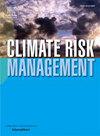The role of weather and climate information services to support in wildfire management in Northwestern Europe
IF 5
2区 环境科学与生态学
Q1 ENVIRONMENTAL SCIENCES
引用次数: 0
Abstract
As climate change intensifies, temperatures rise and extreme weather events become more frequent, leading to increased droughts and elevated wildfire risks. This trend is especially pronounced in with an emerging wildfire risk under climate change, including Northwestern Europe. This study evaluates the use and needs of climate information services (CIS) for supporting Integrated Fire Management in these regions. Employing a qualitative approach, an online survey was distributed to professional stakeholders in Northwestern Europe, focusing on their awareness and perception of preparedness for wildfires, their use of CIS, and their future needs for fire management.
Results indicate that while stakeholders are experiencing wildfires and although there is a high perception of preparedness for current wildfire conditions, their preparedness for future conditions is considerably lower. Most rely on short-term weather forecasts, yet there is a significant gap in the use and perceived need for long-term climate projections. Additionally, engagement with and awareness of the European Forest Fire Information System (EFFIS) are limited. The findings underscore the critical need for more detailed and locally relevant CIS that are salient, credible, and legitimate to foster proactive and adaptive management strategies. Enhancing stakeholder engagement and co-producing tailored CIS can contribute to improving prevention, preparedness, and resilience against the escalating threat of wildfires in Northwestern Europe.
天气和气候信息服务在支持西北欧野火管理中的作用
随着气候变化加剧,气温上升,极端天气事件变得更加频繁,导致干旱和野火风险增加。这一趋势在气候变化下出现的野火风险中尤为明显,包括欧洲西北部。本研究评估了气候信息服务(CIS)在这些地区支持综合消防管理的使用和需求。采用定性方法,向西北欧的专业利益相关者分发了一份在线调查,重点关注他们对野火准备的认识和看法、他们对CIS的使用以及他们未来对火灾管理的需求。结果表明,虽然利益相关者正在经历野火,尽管他们对当前野火状况的准备程度很高,但他们对未来状况的准备程度要低得多。大多数依赖于短期天气预报,但在长期气候预测的使用和感知需求方面存在重大差距。此外,对欧洲森林火灾信息系统(EFFIS)的参与和认识有限。研究结果强调,迫切需要更详细的、与当地相关的、突出的、可信的、合法的CIS,以促进积极的、适应性的管理战略。加强利益相关者的参与和共同制定量身定制的CIS可以有助于改善欧洲西北部野火威胁升级的预防、准备和复原力。
本文章由计算机程序翻译,如有差异,请以英文原文为准。
求助全文
约1分钟内获得全文
求助全文
来源期刊

Climate Risk Management
Earth and Planetary Sciences-Atmospheric Science
CiteScore
8.20
自引率
4.50%
发文量
76
审稿时长
30 weeks
期刊介绍:
Climate Risk Management publishes original scientific contributions, state-of-the-art reviews and reports of practical experience on the use of knowledge and information regarding the consequences of climate variability and climate change in decision and policy making on climate change responses from the near- to long-term.
The concept of climate risk management refers to activities and methods that are used by individuals, organizations, and institutions to facilitate climate-resilient decision-making. Its objective is to promote sustainable development by maximizing the beneficial impacts of climate change responses and minimizing negative impacts across the full spectrum of geographies and sectors that are potentially affected by the changing climate.
 求助内容:
求助内容: 应助结果提醒方式:
应助结果提醒方式:


